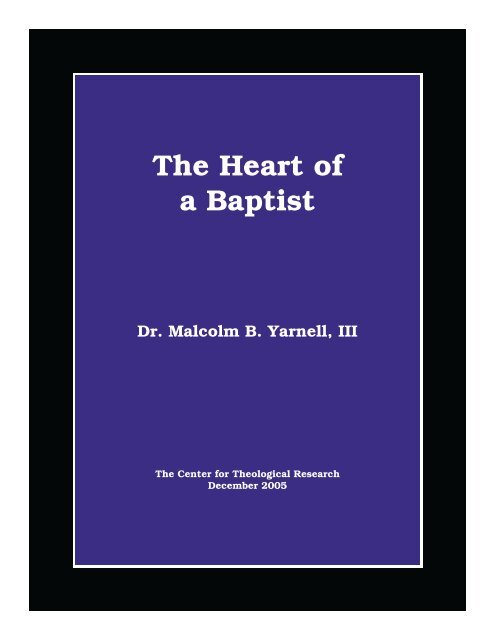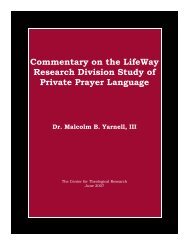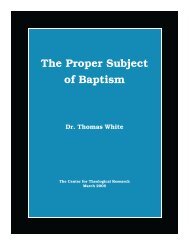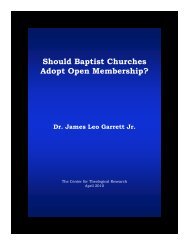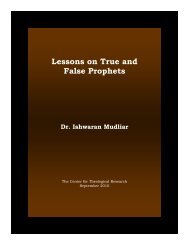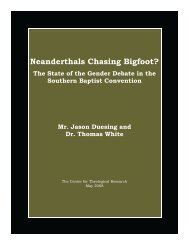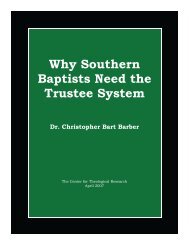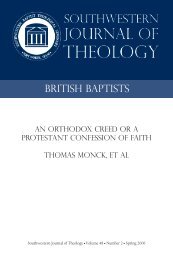The Heart of a Baptist - Baptist Theology
The Heart of a Baptist - Baptist Theology
The Heart of a Baptist - Baptist Theology
Create successful ePaper yourself
Turn your PDF publications into a flip-book with our unique Google optimized e-Paper software.
<strong>The</strong> <strong>Heart</strong> <strong>of</strong>a <strong>Baptist</strong>Dr. Malcolm B. Yarnell, III<strong>The</strong> Center for <strong>The</strong>ological ResearchDecember 2005
White Paper 2Published by the Center for <strong>The</strong>ological Researchat www.<strong>Baptist</strong><strong>The</strong>ology.org© 2005 Malcolm B. YarnellAn earlier version <strong>of</strong> this sermon was preached for the leadership <strong>of</strong> theSouthern <strong>Baptist</strong>s <strong>of</strong> Texas Convention and subsequently for the faculty andstudents <strong>of</strong> Criswell College. It has been prepared for publication at theencouragement <strong>of</strong> Jim Richards and Jerry Johnson, respectively thepresidents <strong>of</strong> those two institutions. Thanks to Jason Lee, John Mark Yeats,Jason Duesing, Madison Grace, Thomas Winborn, and Karen Yarnell fortheir helpful editorial comments. Special thanks to President Paige Pattersonfor allowing it to be shared with Southwestern <strong>Baptist</strong> <strong>The</strong>ological Seminaryon Founders Day, 9 March 2006Permissions: <strong>The</strong> purpose <strong>of</strong> this material is to serve the churches. Pleasefeel free to distribute as widely as possible. We ask that you maintain theintegrity <strong>of</strong> the document and the author’s wording by not making anyalterations. For special requests please contact the editorial board for theWhite Papers for approval at ctr@swbts.edu.<strong>The</strong> Center for <strong>The</strong>ological ResearchSouthwestern <strong>Baptist</strong> <strong>The</strong>ological SeminaryFort Worth, TexasMalcolm B. Yarnell, III, Director
<strong>The</strong> <strong>Heart</strong> <strong>of</strong> a <strong>Baptist</strong>A White Paper from <strong>The</strong> CTR“<strong>The</strong> <strong>Heart</strong> <strong>of</strong> a <strong>Baptist</strong>”This sermon comes from a heart breaking for <strong>Baptist</strong>s, for we have begun to loseour way.IntroductionThroughout its twenty centuries <strong>of</strong> history, the <strong>Baptist</strong> movement has been underattack from numerous directions, from the outside by individuals, both non-Christian andChristian, and by hostile public authorities; and from the inside by those who wouldcompromise the integrity <strong>of</strong> the <strong>Baptist</strong> faith. <strong>The</strong>se attacks have varied as to time andplace, as to ferocity and duration, as to their systemic or ad hoc nature, and as to thedegree <strong>of</strong> their success or failure. However, they all have one thing in common: they seekto bring trauma, even permanent arrest, to the heart <strong>of</strong> the <strong>Baptist</strong> movement.Unfortunately, some who have conducted such attacks, especially those who themselvesclaim to be <strong>Baptist</strong>s, are not always aware <strong>of</strong> the trauma they are causing.Today, we must examine Scripture for the heart <strong>of</strong> the <strong>Baptist</strong> and clearly andcarefully identify those internal agents which would cause it harm. <strong>The</strong>re are three thingsto be considered: the biblical center <strong>of</strong> the <strong>Baptist</strong> movement; the heart <strong>of</strong> a <strong>Baptist</strong>; and,the traumas which threaten the integrity <strong>of</strong> that heart.I. <strong>The</strong> Biblical Center <strong>of</strong> the <strong>Baptist</strong> MovementIn my historical theology classes, especially those that deal with the Reformation,the students are introduced to the phenomenon that various movements have readScripture through various scriptural lenses, through certain biblical centers. Inevitably,Roman Catholics will point to the exchange between Jesus and Peter in Matthew 16 asthe basis for their grant <strong>of</strong> ordinary and juridical authority to the Pope, the bishop <strong>of</strong>Rome. By an incredible display <strong>of</strong> hermeneutical gymnastics, they believe he is the heir<strong>of</strong> Peter and the vicar <strong>of</strong> Christ. Inevitably, Lutherans will point to those foundationalPauline passages in Romans 1–8 and Galatians which teach the pristine Reformationdoctrine <strong>of</strong> justification by faith alone in Christ alone. Inevitably, the Reformed orCalvinists will point to the critical Pauline passages in Romans 9–11 and Ephesians 1which teach the doctrine <strong>of</strong> election. Inevitably, the Anabaptists will point others to thosewonderful discipleship-oriented passages <strong>of</strong> the Gospels, especially the Sermon on theMount. Preachers and teachers from these traditions have learned to propagate theirrespective denominational faiths by reference to these passages. <strong>The</strong>y then read theremainder <strong>of</strong> Scripture by reference to their particular foundational passage or biblicalcenter.<strong>Baptist</strong>s wish to understand and affirm Scripture in its entirety, and yet they tooknow that certain passages are central to <strong>Baptist</strong> hermeneutics. Of the four Reformation-<strong>Baptist</strong><strong>The</strong>ology.orgPage 1 <strong>of</strong> 12
<strong>The</strong> <strong>Heart</strong> <strong>of</strong> a <strong>Baptist</strong>A White Paper from <strong>The</strong> CTRera traditions just mentioned, <strong>Baptist</strong>s come closest to the Anabaptists, for we are theirtheological heirs, even if we may or may not claim to be their direct historical heirs. Likethe Anabaptists, we read Scripture simply, literally, and with a focus upon Jesus Christ. 1However, <strong>Baptist</strong>s have some unique central passages which influence theirunderstanding <strong>of</strong> the Christian faith. As with the Anabaptists, these passages derive fromthe sayings <strong>of</strong> Jesus Christ. One foundational text for <strong>Baptist</strong>s, especially for Southern<strong>Baptist</strong>s, is found in Matthew 28:16–20, otherwise known as ―the Great Commission.‖<strong>The</strong>se words <strong>of</strong> Jesus, subsequent to his resurrection and prior to his ascension, establishthe purpose, platform, and program <strong>of</strong> the church.Prior to and during the Reformation period, the Great Commission wasconsidered to be primarily for the apostles. <strong>The</strong> comments <strong>of</strong> John Calvin are typical:―when Christ appeared to the disciples, he likewise commissioned them to be apostles, toconvey into every part <strong>of</strong> the world the message <strong>of</strong> eternal life.‖ <strong>The</strong> import <strong>of</strong> Calvin‘sentire discussion is that the commission was for the apostles alone. In his zeal to deny theRoman claim to apostolic succession, the Genevan Reformer never got around toapplying the passage to the modern church, except to say that, ―in the present day, theoperations <strong>of</strong> Christ are carried on wonderfully in a secret manner.‖ 2 Calvin did notconsider the apostolic commission as extending to the visible church!However, another Reformer, a Radical Reformer by the name <strong>of</strong> BalthasarHubmaier, and one <strong>of</strong> the earliest and brightest <strong>of</strong> the Anabaptists, had a differentunderstanding. In the most significant book written on baptism in the sixteenth century,Hubmaier treated the Great Commission as if it were normative for all Christians. Herepeatedly cited Matthew 28:18–20 and its parallels. According to Hubmaier, the GreatCommission must be obeyed by all Christians, ―For a serious command demands seriousobedience and fulfillment.‖ Those who will not follow the commission in its entirety andin an orderly manner are disorderly and disobedient to Jesus Christ. 3 Unfortunately, in thelate seventeenth and early eighteenth century, <strong>Baptist</strong>s tended to emulate Calvin ratherthan Hubmaier regarding contemporary application <strong>of</strong> the Great Commission.But in 1785, the Particular <strong>Baptist</strong> minister, William Carey, burdened by theSpirit <strong>of</strong> God for the salvation <strong>of</strong> all the nations, questioned the Calvinistic truism. Hewas promptly accused <strong>of</strong> compromising the sovereignty <strong>of</strong> God. John Collett Ryland, ahyper-Calvinist <strong>Baptist</strong> minister, retorted, ―Sit down, young man; when God wants toconvert the heathen, He‘ll do it without your help or mine.‖ 4 Carey, out <strong>of</strong> respect for theold minister, may have sat down, but the fate <strong>of</strong> the lost continued to eat at his heart.After years <strong>of</strong> study, both <strong>of</strong> the Bible and <strong>of</strong> the needs <strong>of</strong> the world, Carey issued hisfamous booklet, An Enquiry into the Obligations <strong>of</strong> Christians, in which he examinedwhether the Commission should be restricted to the apostles. His reply was threefold: if1 Stuart Murray, Biblical Interpretation in the Anabaptist Tradition (Kitchener, Ontario: PandoraPress, 2003), 70–93.2 John Calvin, Commentary on a Harmony <strong>of</strong> the Evangelists, Matthew, Mark, and Luke, trans.William Pringle (Reprint, Grand Rapids: Baker, 1996), 3:380–81, 391.3 Balthaser Hubmaier, On the Christian Baptism <strong>of</strong> Believers (1525), in Balthaser Hubmaier:<strong>The</strong>ologian <strong>of</strong> Anabaptism, trans. and ed. H. Wayne Pipkin and John H. Yoder (Scottdale, Pennsylvania:Herald Press, 1989), 95–149.4 Ernest A. Payne, ―Introduction,‖ to William Carey, An Enquiry into the Obligations <strong>of</strong> Christians,To Use Means for the Conversion <strong>of</strong> the Heathens (1792; Introduction, 1961; Reprint, Didcot: <strong>Baptist</strong>Missionary Society, 1991), 11.<strong>Baptist</strong><strong>The</strong>ology.orgPage 2 <strong>of</strong> 12
<strong>The</strong> <strong>Heart</strong> <strong>of</strong> a <strong>Baptist</strong>A White Paper from <strong>The</strong> CTRthe command to make disciples <strong>of</strong> all nations is restricted to the apostles, then so is thecommand to baptize; if the commission is restricted to the apostles, then subsequentevangelists have been disobedient; and, if the commission is restricted to the apostles,then Christ‘s statement with regard to his continuing presence is nonsensical, for theapostles are already dead. 5 For Carey, the Father <strong>of</strong> the Modern Missions Movement, theGreat Commission was absolutely central to <strong>Baptist</strong> faith and practice.In 1814, when American <strong>Baptist</strong>s first began to organize themselves into aconvention, a southern minister was asked to preach. Richard Furman, pastor <strong>of</strong> First<strong>Baptist</strong> Church <strong>of</strong> Charleston, South Carolina, and the first president <strong>of</strong> the TriennialConvention, chose as his text the Great Commission. <strong>The</strong> convention was so impressedthat they asked Furman‘s permission to publish his sermon with their proceedings. 6 In1845, when the Southern <strong>Baptist</strong> Convention was formed, the address <strong>of</strong> the conventionnoted that, ―Our objects, then, are the extension <strong>of</strong> the Messiah‘s kingdom, and the glory<strong>of</strong> our God.‖ 7 <strong>The</strong> founders <strong>of</strong> the Southern <strong>Baptist</strong> Convention believed in the GreatCommission as the best way to glorify God. B.H. Carroll, the founder <strong>of</strong> Southwestern<strong>Baptist</strong> <strong>The</strong>ological Seminary, believed this commission has ―the greatest <strong>of</strong> allauthority‖ for Southern <strong>Baptist</strong>s, whom he called, ―Missionary <strong>Baptist</strong>s.‖ 8When the leading executives in this denomination gather today to coordinate theirstrategy, they refer to themselves as ―<strong>The</strong> Great Commission Council.‖ In theInternational Mission Board <strong>of</strong> the SBC, missionaries <strong>of</strong>ten speak <strong>of</strong> ―Great CommissionChristians‖ and their magazine is entitled, Commission. In most Southern <strong>Baptist</strong>churches today, you will find the Great Commission is central in their ethos and <strong>of</strong>ten intheir documents. And for the 160 th year <strong>of</strong> this great convention, to support his laudablegoal <strong>of</strong> reminding Southern <strong>Baptist</strong>s about their responsibility to be baptizers, BobbyWelch chose the Great Commission as the convention‘s central text. 9 <strong>Baptist</strong>s, especiallySouthern <strong>Baptist</strong>s, have been and are a Great Commission people!<strong>The</strong>re are five Greek terms which are critical for understanding the text <strong>of</strong> theGreat Commission and therefore, the heart <strong>of</strong> a <strong>Baptist</strong>: Iesous, poreuthentes,matheteusate, baptizontes, and didaskontes. <strong>The</strong> one noun in the group <strong>of</strong> terms, Iesous,dominates, directly or pronominally, every verse in the passage. <strong>The</strong> one full verb is anaorist active imperative, matheteusate, and is the central command <strong>of</strong> the commission.<strong>The</strong> three participles or verbal adjectives–poreuthentes, baptizontes, and didaskontes—also function in an imperatival sense, but are grammatically dependent uponmatheteusate. 10 Let us read the Great Commission, humbly and reverently seeking theSpirit‘s illumination:5 Carey, An Enquiry into the Obligations <strong>of</strong> Christians, 35–37.6 James A. Rogers, Richard Furman: Life and Legacy (Macon: Mercer University Press, 2001),153–54.7 William B. Johnson, ―<strong>The</strong> Southern <strong>Baptist</strong> Convention, To the Brethren in the United States; tothe congregations connected with the respective Churches; and to all candid men,‖ in Proceedings <strong>of</strong> theSouthern <strong>Baptist</strong> Convention (Richmond, Virginia: Ellyson, 1845), 19.8 B.H. Carroll, An Interpretation <strong>of</strong> the English Bible: <strong>The</strong> Four Gospels, ed. J.B. Cranfill (GrandRapids: Broadman, 1948), I:434.9 Annual <strong>of</strong> the 2005 Southern <strong>Baptist</strong> Convention (Nashville: Executive Committee, Southern<strong>Baptist</strong> Convention, 2005), 38.10 David Allen, Dean <strong>of</strong> the School <strong>of</strong> <strong>The</strong>ology at Southwestern <strong>Baptist</strong> <strong>The</strong>ological Seminary,has incorporated a number <strong>of</strong> changes in the preaching program for our students, including the use <strong>of</strong> the<strong>Baptist</strong><strong>The</strong>ology.orgPage 3 <strong>of</strong> 12
<strong>The</strong> <strong>Heart</strong> <strong>of</strong> a <strong>Baptist</strong>A White Paper from <strong>The</strong> CTRBut the eleven disciples proceeded to Galilee, to the mountain which Jesus[Iesous] had designated. When they saw Him, they worshiped Him butsome were doubtful. And Jesus came up and spoke to them, saying, ―Allauthority has been given to Me in heaven and on earth. Go [poreuthentes]therefore and make disciples [matheteusate] <strong>of</strong> all the nations, baptizing[baptizontes] them in the name <strong>of</strong> the Father and the Son and the HolySpirit, teaching [didaskontes] them to observe all that I commanded you;and lo, I am with you always, even to the end <strong>of</strong> the age.‖II. <strong>The</strong> <strong>Heart</strong> <strong>of</strong> a <strong>Baptist</strong><strong>The</strong> heart <strong>of</strong> a <strong>Baptist</strong> has a source <strong>of</strong> life and four chambers, each <strong>of</strong> which isquite evident in this central text. <strong>The</strong> source <strong>of</strong> life for the <strong>Baptist</strong> heart is Jesus Christ.<strong>The</strong> four chambers are: a compelling desire to engage in the mission <strong>of</strong> evangelism, a callfor personal conversion, the regenerate church, and an authoritative Bible.A. Iesous: “Jesus.” <strong>The</strong> <strong>Baptist</strong> heart gains its life through Jesus. <strong>Baptist</strong>sbelieve in the centrality <strong>of</strong> Jesus Christ, both in His divine-human person and in Hisatoning work.Christ is central to this text and to our faith. <strong>The</strong> disciples came to Galilee and―when they saw Him, they worshiped Him.‖ Why worship this man? We worship JesusChrist because He is God; because He is our salvation; because He is our way, our truth,our life. In His person, Christ bridges the divide between God and man. In His atoningwork, Christ bridges the divide between a righteous, wrathful God and sinful humanityby the propitiatory shedding <strong>of</strong> His blood. Christ, our redemption, is applied to our heart,through regeneration by the Holy Spirit, all for the glory <strong>of</strong> God. Indeed, we might evenbe bold enough to say that it is the life-giving blood <strong>of</strong> Jesus that courses through the<strong>Baptist</strong> heart.Yes, <strong>Baptist</strong>s worship a Triune God, for we are baptized in the one name <strong>of</strong> thethreefold God. Yet, unlike some evangelicals, we recognize that the Trinity is focusedprimarily on the glorification <strong>of</strong> the Son. <strong>The</strong> Spirit Himself glorifies Christ, andtherefore, we glorify Christ. <strong>The</strong> Father Himself glorifies Christ, and therefore, we glorifyChrist. Yes, we also glorify the Father because Christ glorifies the Father. Yes, we alsoglorify the Spirit because He, too, is God. 11 But the Trinity is primarily focused onglorifying the Son; therefore, we simple Biblicists primarily glorify the Son, too. <strong>Baptist</strong>sare a Christocentric people. Ask a <strong>Baptist</strong> child what she believes and she will invariablybegin her answer with the precious name <strong>of</strong> ―Jesus.‖A Prayer: ―Oh, Jesus, you promised to remain with us ‗even to the end <strong>of</strong>the age.‘ In you is our hope. In you is our joy. In you is our way, our truth,and our life. We know that you became a man for our sake. We know thatyou died on the cross for our sake. We know that you rose from the deadfor our sake. We know that, even now, you are with us. We trust that youGreek text in sermon preparation. <strong>The</strong> current preacher/pr<strong>of</strong>essor has long advocated expository preachingand is elated to see Dr. Allen lead Southwestern‘s proclamation courses in this direction.11 Cf. Malcolm Yarnell, ―<strong>The</strong> Glory <strong>of</strong> God,‖ Southwestern <strong>Baptist</strong> <strong>The</strong>ological Seminary Chapel,30 October 2003 [Video-recording] (Fort Worth, Texas: Roberts Library, 2003).<strong>Baptist</strong><strong>The</strong>ology.orgPage 4 <strong>of</strong> 12
<strong>The</strong> <strong>Heart</strong> <strong>of</strong> a <strong>Baptist</strong>A White Paper from <strong>The</strong> CTRwill keep us from all harm. You, you are the norm by which everythingelse is judged. You, you fulfill the Old Testament. You, you are revealedin the New Testament. Oh, Jesus, come again, show us those wounds thatbled and that body that died for our sin. Oh, Jesus, come again, we desireto worship you in the flesh which rose again for our redemption. Oh,Jesus, we thank you for being with us, even now, by your Spirit. Oh,Jesus, we worship you. Our life is in you, Second Person <strong>of</strong> the Trinity,fully God and fully man.‖To be a <strong>Baptist</strong> is to be Christ-centered.B. Poreuthentes: “Going.” <strong>The</strong> first chamber <strong>of</strong> the <strong>Baptist</strong> heart is thechamber through which the <strong>Baptist</strong> blood must spill itself and thereby grow thenumber <strong>of</strong> <strong>Baptist</strong> hearts glorifying God in the church: a mission <strong>of</strong> evangelism.Tertullian, the early church father who questioned the novel practice <strong>of</strong> infantbaptism, knew that the best ground for the growth <strong>of</strong> the Christian faith is that groundwhich has soaked the blood <strong>of</strong> the martyrs. <strong>The</strong> blood <strong>of</strong> the martyrs – martus means―witness‖ – is the seed <strong>of</strong> the church. 12 ―Martyrs‖ are those Christians who are willing topublicly and privately confess Christ in all situations, no matter what the danger. When<strong>Baptist</strong>s truly understand the commission <strong>of</strong> Jesus Christ to make disciples by going,teaching, baptizing, they know they must go. Jesus said, ―Go.‖ Go? Go!<strong>Baptist</strong>s ―go‖ when they proclaim the message <strong>of</strong> Jesus Christ in every placeacross all borders and every other barrier, to every people in every language with thecolor <strong>of</strong> every skin, at all times in every situation without exception. Jesus said, ―Go.‖ Ifthe government says, ―Stay,‖ and Jesus says, ―Go,‖ <strong>Baptist</strong>s go. If your comfort levelsays, ―Stay,‖ and Jesus says, ―Go,‖ a <strong>Baptist</strong> will go. If your culture cries, ―Stay,‖ andJesus says, ―Go,‖ <strong>Baptist</strong>s must go. Wherever the obstacle, it must be crossed. Whoeverthe opponent, he must be lovingly defeated. Whatever the problem, it must be solved.Our task is to go. Go! Go! Go! <strong>Baptist</strong>s are a people who will not be stopped by anythingin their attempt to glorify God by making disciples in every situation. <strong>The</strong> <strong>Baptist</strong> whoclaims not to be an evangelist is simply not a <strong>Baptist</strong>. <strong>Baptist</strong>s are always on mission, themission <strong>of</strong> evangelism. To be a <strong>Baptist</strong> is to be an evangelist.C. Matheteusate: “Make disciples.” <strong>The</strong> second chamber <strong>of</strong> the <strong>Baptist</strong> heart isthe chamber through which the life that is available by the blood <strong>of</strong> Jesus Christbecomes ours personally: the salvation that begins with the free gift <strong>of</strong> justification andproceeds to full discipleship.Jesus has commanded his disciples to ―make disciples.‖ <strong>The</strong> <strong>Baptist</strong> business isthe business <strong>of</strong> preaching the free gift <strong>of</strong> justification, <strong>of</strong> preaching the conversion <strong>of</strong>sinners, and <strong>of</strong> preaching the need to carry the cross.<strong>Baptist</strong>s affirm the Reformation doctrines <strong>of</strong> sola fide, sola gratia, and solusChristus. Justification is by faith alone, through grace alone, in Christ alone. We are notsaved by our own efforts, but by simply believing in the efforts <strong>of</strong> Christ on our behalf.Before the divine throne, in the highest court <strong>of</strong> creation, the righteousness <strong>of</strong> Christ isdeclared to be our righteousness as a gift. By reason <strong>of</strong> our union with Christ, the Father12 Tertullian, Apology, 50, in Ante-Nicene Fathers, 3:55.<strong>Baptist</strong><strong>The</strong>ology.orgPage 5 <strong>of</strong> 12
<strong>The</strong> <strong>Heart</strong> <strong>of</strong> a <strong>Baptist</strong>A White Paper from <strong>The</strong> CTRdeclares the sinner righteous. He looks at me, a sinner, and sees Christ, the righteous One.It is Christ‘s righteousness, a righteousness alien to us, which saves us.However, justification is only one aspect <strong>of</strong> salvation. Inter alia, salvationincludes conversion and discipleship. By conversion, we affirm two things: faith andrepentance. We tell people that they must be born again. Your mother cannot help you,your father cannot heal you, your preacher cannot preserve you, your doctor cannotprotect you, and you cannot save yourself. Only Christ can save you: you must trust inHim and turn from your sins. ―Repent and believe‖ is the message <strong>of</strong> Jesus (Mark 1:15).<strong>The</strong>refore, ―repent and believe‖ is the message <strong>of</strong> <strong>Baptist</strong>s. To believe that Jesus died androse again is not enough until you believe that Jesus died and rose again for you. <strong>The</strong><strong>Baptist</strong> faith is a personal faith, a faith for disciples <strong>of</strong> Jesus.<strong>The</strong> <strong>Baptist</strong> faith is also about discipleship. <strong>The</strong> person who claims to be aChristian, but is unwilling to take up the cross, should be considered a hypocrite. <strong>The</strong>Christian faith issues forth in an obedient life to the commands <strong>of</strong> Jesus Christ. Wemeasure our soteriological assurance by the measures <strong>of</strong> 1 John: confession <strong>of</strong> the fullhumanity and full deity <strong>of</strong> Jesus Christ, love <strong>of</strong> the brethren, and obedience to thecommandments <strong>of</strong> Jesus Christ. Salvation does not begin in good works, but it sure doesend up there! To be a <strong>Baptist</strong> is to be a disciple <strong>of</strong> Jesus.D. Baptizontes: “Baptizing.” <strong>The</strong> third chamber <strong>of</strong> the <strong>Baptist</strong> heart is thechamber through which the <strong>Baptist</strong> heart begins to join itself with the beat <strong>of</strong> other<strong>Baptist</strong> hearts: regenerate church membership evidenced by baptism for believers only.Jesus called his people to not only make disciples by going and teaching, but alsoby baptizing. Apart from baptism into the local church in the name <strong>of</strong> the Triune God, theGreat Commission is unfulfilled. Jesus said, ―Baptize.‖ Baptize? Baptize!<strong>Baptist</strong>s are baptizers. It is absolutely incredible the secondary and tertiaryconcerns which have been brought forward to define the heart <strong>of</strong> the <strong>Baptist</strong> movement.E.Y. Mullins has done some good, but his attempt to define <strong>Baptist</strong>s according to asolipsistic ―soul competency‖ has unfortunately encouraged theological liberalism in ourdenomination. What, then, is the beginning <strong>Baptist</strong> distinctive? It is baptism! Baptism, Isay! Baptism is the <strong>Baptist</strong> distinctive which leads all other <strong>Baptist</strong> distinctives! Stoplooking elsewhere for who you are. If you are a <strong>Baptist</strong>, your beginning distinctive isbaptism: baptism for believers only; baptism by immersion alone; baptism based uponone‘s pr<strong>of</strong>ession <strong>of</strong> faith; baptism as a meaningful symbolic representation <strong>of</strong> personalconversion; baptism as a faith commitment; baptism as an ethical commitment; baptisminto a local congregation; baptism as participation in the death and resurrection <strong>of</strong> JesusChrist; baptism as identification with the one God who is yet three—Father, Son, andHoly Spirit; baptism as a public testimony to regeneration. Baptism! Baptism! Baptism!As Hubmaier, the Anabaptist martyr, discovered, after examining the numerousreferences to baptism in the New Testament, the order <strong>of</strong> the commandments in the GreatCommission only supports believers-only baptism. According to Hubmaier, the propersequence or order in the New Testament is: Wort, Glaub, Tauff, Werck; word, faith,baptism, work. 13 This order is evident in the Great Commission, too. Did you notice theorder <strong>of</strong> the verbs: going, make disciples, baptizing, teaching? <strong>The</strong> proclamation <strong>of</strong> theWord and the making <strong>of</strong> a disciple always precede baptism. Without the Word, active by13 Hubmaier, On the Christian Baptism <strong>of</strong> Believers, in Balthasar Hubmaier, 128.<strong>Baptist</strong><strong>The</strong>ology.orgPage 6 <strong>of</strong> 12
<strong>The</strong> <strong>Heart</strong> <strong>of</strong> a <strong>Baptist</strong>A White Paper from <strong>The</strong> CTRthe Spirit in the human through faith, there is no baptism. It may be a bath, but it is notbaptism. Unless the Word and faith precede baptism, there is no baptism. Southern<strong>Baptist</strong>s must rediscover their heritage as a believers-only Free Church people. Withoutbaptism based upon public pr<strong>of</strong>ession <strong>of</strong> faith, we are disorderly and disobedient! Myfriends, give a Christian an open Bible and you will get a <strong>Baptist</strong> every time. Baptism isthe beginning <strong>Baptist</strong> distinctive.Baptism reserved for believers only is the beginning <strong>of</strong> <strong>Baptist</strong> ecclesiology. Suchbaptism guarantees the visible church will only be joined by those who visibly,courageously, and convincingly pr<strong>of</strong>ess the Christian faith. Two other necessary parts <strong>of</strong>the <strong>Baptist</strong> ecclesiological harmony are: second, the continuing sign <strong>of</strong> personalfellowship with the body <strong>of</strong> Christ, the Lord‘s Supper; and third, the practice <strong>of</strong> churchdiscipline. When church membership is restricted to believers baptized upon theirpr<strong>of</strong>ession <strong>of</strong> faith; when the Lord‘s Supper is understood in a memorial or spiritual senseand restricted to the regenerate membership (1 Cor 5); when Christ‘s command todiscipline the church is practiced regularly, rightly, and for the purpose <strong>of</strong> redemption(Matt 18:15–20); then the integrity <strong>of</strong> the local church is preserved. <strong>The</strong> regeneratechurch that retains its integrity in these areas will ultimately manifest those otherimportant <strong>Baptist</strong> distinctives: the autonomy—better yet, Christonomy—<strong>of</strong> the localchurch, the cooperation <strong>of</strong> local churches for the purpose <strong>of</strong> advancing the kingdom <strong>of</strong>God, religious liberty, and the separation <strong>of</strong> church and state. Baptism is the beginning<strong>Baptist</strong> distinctive. 14E. Didaskontes: “Teaching.” <strong>The</strong> final chamber <strong>of</strong> the <strong>Baptist</strong> heart is thechamber which defines our authority: <strong>Baptist</strong>s base all <strong>of</strong> their teachings upon theauthoritative text which we call the Bible, the very Word <strong>of</strong> God.Christ commands us to ―teach them to observe all things that I have commandedyou.‖ How do we know what He has commanded us? We know the commandments <strong>of</strong>Jesus by no other means than through the Bible as illuminated by the Spirit who inspiredit. <strong>Baptist</strong>s, especially Southern <strong>Baptist</strong>s, are notoriously identified, from within and fromwithout, as a ―people <strong>of</strong> the book.‖ We are committed to the biblical doctrine thatScripture was inspired by the Holy Spirit and is thus inerrant, infallible, and sufficient forour faith and practice. A perfect Person, the Spirit <strong>of</strong> God, inspired the prophets and theapostles to write the perfect book, the Bible. <strong>The</strong> writers in their writings are, as a result,without error. This inerrancy extends not only to the most important matter <strong>of</strong> salvation,but also to matters <strong>of</strong> history and science.<strong>The</strong> sufficiency <strong>of</strong> Scripture states that our ―doctrines‖—that is, our teachings—need to be drawn from the Bible, and that we may never go beyond the Bible for ourauthority. Scripture, in other words, is sufficient for the message and practice <strong>of</strong> <strong>Baptist</strong>churches and their people. Requiring anything more than that which the Bible requires is,14 Unfortunately, there has been little written within the last half-century explicating the biblicaland <strong>Baptist</strong>ic understanding <strong>of</strong> believers-only baptism by immersion. James Leo Garrett, Jr., ―<strong>Baptist</strong>sConcerning Baptism: Review and Preview,‖ Southwestern Journal <strong>of</strong> <strong>The</strong>ology 43 (2001): 52–67. <strong>Baptist</strong>pastors and scholars must once again delineate a view <strong>of</strong> baptism which avoids both ecumenism andsacramentalism on the left (cf. Anthony R. Cross and Philip E. Thompson, <strong>Baptist</strong> Sacramentalism[Waynesboro, GA: Paternoster, 2003]) and a close identification with scholastic Calvinism on the right (cf.Fred Malone, <strong>The</strong> Baptism <strong>of</strong> Disciples Alone: A Covenantal Argument for Credobaptism VersusPaedobaptism [Cape Coral, FL: Founders Press, 2003]).<strong>Baptist</strong><strong>The</strong>ology.orgPage 7 <strong>of</strong> 12
<strong>The</strong> <strong>Heart</strong> <strong>of</strong> a <strong>Baptist</strong>A White Paper from <strong>The</strong> CTRby basic <strong>Baptist</strong> definition, a legalistic heresy. Requiring anything less than that whichthe Bible requires is, by basic <strong>Baptist</strong> definition, a liberal heresy. We find our authority inthe Bible alone, no more and no less. On the one hand, <strong>Baptist</strong>s teach all things containedin God‘s Word. On the other hand, all that <strong>Baptist</strong>s teach is contained in God‘s Word. Tobe a <strong>Baptist</strong> is to teach the Bible entirely and the Bible alone.This is the <strong>Baptist</strong> heart. It has its source <strong>of</strong> life in the person and work <strong>of</strong> JesusChrist, and it has four chambers: a mission <strong>of</strong> evangelism, personal salvation, theregenerate church, and an authoritative Bible.III. <strong>The</strong> Traumas Which Endanger the <strong>Baptist</strong> <strong>Heart</strong>A surgeon must be a precisionist. When he takes the scalpel to the precioustissues <strong>of</strong> the human heart, it behooves him to make no mistakes: to move neither too fastnor too slow, too deep nor too shallow, too far to the right nor too far to the left. Asurgeon must be extremely careful. Likewise, the <strong>Baptist</strong> theologian must be carefulwhen excising those dangerous tissues which threaten to traumatize the <strong>Baptist</strong> heart.However, surgery nevertheless is sometimes required. <strong>The</strong>re comes a time whenthe danger <strong>of</strong> inaction is greater than the possible dangers <strong>of</strong> action. Now is a time forsurgery. Please allow me to identify five critical issues or calcified tissues which threatenthe <strong>Baptist</strong> heart.A. <strong>The</strong> First Calcified Tissue is the Loss <strong>of</strong> Biblical Fidelity.We know well the danger <strong>of</strong> liberal theology. <strong>The</strong> acidic results <strong>of</strong> highercriticism have been felt by our denomination, and beginning in 1979, the Southern<strong>Baptist</strong> Convention engaged in a major act <strong>of</strong> self-surgery. This was necessary and atleast within our seminaries, may now be proclaimed to be largely successful. In ourapparent victory, however, we must not lose vigilance. Liberalism can so easily return tothose with keen minds, who may be tempted to consider their thoughts to be greater thanGod‘s thoughts.<strong>The</strong>re is another danger with reference to the Bible, however. This danger isbiblical ignorance in the pulpit and the pew. <strong>The</strong> preacher who refuses to let the Biblepreach itself in an expository manner threatens his people with the state <strong>of</strong> spiritual andmoral anemia. <strong>The</strong> Sunday School teacher who asks what his students feel about the textrather than how the text feels about the student threatens his people with the state <strong>of</strong> selfinducedhypnosis. <strong>The</strong> father who neglects to open the Word <strong>of</strong> God in his home and leadhis family in prayer and devotional worship condemns his children and grandchildren toignorance and possible spiritual death. <strong>The</strong> individual who leaves the pages <strong>of</strong> his Bibleunturned on a daily basis is out <strong>of</strong> communion with His God. How do you expect to hearGod if you don‘t open your ears to His Word?Whatever happened to our emphasis for children to engage in Scripturememorization? Where has our foundational biblical literacy gone? Why do many <strong>Baptist</strong>sno longer bring a Bible to church? <strong>The</strong> calcified tissues <strong>of</strong> biblical infidelity and illiteracyare threatening to arrest the <strong>Baptist</strong> heart.<strong>Baptist</strong><strong>The</strong>ology.orgPage 8 <strong>of</strong> 12
<strong>The</strong> <strong>Heart</strong> <strong>of</strong> a <strong>Baptist</strong>A White Paper from <strong>The</strong> CTRB. <strong>The</strong> Second Critical Issue is the Calvinist-Arminian Debate.This debate has been with <strong>Baptist</strong>s at least since their later beginnings inEngland‘s ―Long Reformation.‖ 15 <strong>The</strong> Particular <strong>Baptist</strong>s <strong>of</strong> the seventeenth centuryadvocated all five points <strong>of</strong> the Synod <strong>of</strong> Dort. <strong>The</strong> General <strong>Baptist</strong>s denied at least theconception that Christ died simply for the elect. Today, the debate continues. <strong>The</strong>reshould be little concern with a low-key debate which can be and is quite healthy.However, the debate can become quite unhealthy when some <strong>Baptist</strong>s demandthat others advocate their particular position. I am not a five-point Calvinist myself.Neither am I, by any stretch <strong>of</strong> the Reformed imagination, anywhere near being a rankArminian. My Reformed students cheer when they hear me quote Calvin favorably. <strong>The</strong>ygrouse when they hear me decry the dangers <strong>of</strong> Reformed theology. My less-Reformedstudents cheer when they hear me advocate human responsibility. <strong>The</strong>y grouse when theyhear me advocate our absolute dependence upon divine grace. And they all grouse when Idiscover what their personal positions are and then make them publicly debate on behalf<strong>of</strong> the opposing position.Hyper-Calvinism is becoming a real problem in the Southern <strong>Baptist</strong> Convention.When a Calvinist allows his own reason to draw lines where Scripture does not drawthem, he becomes a hyper-Calvinist. According to Timothy George, hyper-Calvinism isdefined doctrinally as the advocacy <strong>of</strong> eternal justification, ethically as the surrender toantinomianism, and evangelistically as the refusal to give an invitation. 16 It is the antiinvitationexpression <strong>of</strong> hyper-Calvinism that currently challenges Southern <strong>Baptist</strong>s.Now, it matters not exactly how you conduct the invitation, but we must treasure thedivine command to be instruments in the calling <strong>of</strong> sinners to repentance and faith. <strong>The</strong>invitation is not to replace baptism, but an invitation to Christ is nonetheless necessary.(Please notice that five-point Calvinism is not necessarily hyper-Calvinism. Moreover,Kevin Kennedy has conclusively shown that not even Calvin was a five-pointer. 17 )Similarly, hyper-Arminianism can be a real problem in the Southern <strong>Baptist</strong>Convention. When an Arminian allows her own reason to draw lines where Scripturedoes not draw them, she becomes a hyper-Arminian. We might define hyper-Arminianism, or Pelagianism, doctrinally as the denial <strong>of</strong> divine election, ethically asserial binges <strong>of</strong> personal wickedness when loss <strong>of</strong> salvation is followed by an unbiblicalregaining <strong>of</strong> salvation, and evangelistically as the refusal to witness due to an explicit orimplicit universalism. Pelagianism is most evident when people assume they savethemselves rather than trusting entirely in the gracious work <strong>of</strong> God.<strong>The</strong>re is room in this convention for people who are five-point Calvinists and forpeople who are not. Consider some recent heroes in Southern <strong>Baptist</strong> life. HerschelHobbs was a one-point Calvinist; W.T. Conner was a two-point Calvinist; the <strong>Baptist</strong>Faith & Message apparently teaches a modest three-point Calvinism; W.A. Criswell wasa four-point Calvinist; and, it is rumored that some <strong>of</strong> my conservative colleagues atanother seminary may be five-point Calvinists. 18 <strong>The</strong>re is room for all <strong>of</strong> the above in the15 Nicholas Tyacke, ed., England’s Long Reformation 1500–1800 (London: UCL Press, 1998).16 Timothy George, ―John Gill,‖ in George and David S. Dockery, eds., <strong>The</strong>ologians <strong>of</strong> the <strong>Baptist</strong>Tradition (Nashville: Broadman & Holman, 2001), 26–28.17 Kevin Kennedy, Union with Christ and the Extent <strong>of</strong> the Atonement in Calvin (Peter Lang,2002).18 Cf. James Leo Garrett, Jr., ―Walter Thomas Conner,‖ David S. Dockery, ―Herschel H. Hobbs,‖and Paige Patterson, ―W.A. Criswell,‖ in <strong>The</strong>ologians <strong>of</strong> the <strong>Baptist</strong> Tradition, 212, 226–27, 247; <strong>The</strong><strong>Baptist</strong><strong>The</strong>ology.orgPage 9 <strong>of</strong> 12
<strong>The</strong> <strong>Heart</strong> <strong>of</strong> a <strong>Baptist</strong>A White Paper from <strong>The</strong> CTRSouthern <strong>Baptist</strong> Convention, but a modest Calvinism is preferable. Problems come whensomeone forces upon others their own non-biblical opinions concerning the details <strong>of</strong> themysterious relationship between the twin biblical truths <strong>of</strong> divine sovereignty and humanresponsibility. Problems also occur when theology becomes an excuse for notevangelizing. <strong>The</strong> calcified tissues <strong>of</strong> hyper-Calvinism and hyper-Arminianism must beexcised from the <strong>Baptist</strong> heart.C. <strong>The</strong> Third Critical Issue concerns the Presbyterian and Quaker Threats to<strong>Baptist</strong> Ecclesiology.Some <strong>Baptist</strong>s have been toying with Presbyterian structures in their churches,arguing for multiple elders, or for a forced distinction between teaching and ruling elders.<strong>The</strong>se are minor concerns, but a problem really occurs when they allow eldership to limitcongregational oversight. Recently, the most prominent Reformed <strong>Baptist</strong>, John Piper,has begun to move his church toward open membership. In other words, you won‘t haveto be baptized to join his church. Of course, Piper‘s movement away from <strong>Baptist</strong>ecclesiology did not begin with open membership. <strong>The</strong>re were earlier signs <strong>of</strong> a relentlessmove towards Presbyterianism, including the adoption <strong>of</strong> multiple elders and opencommunion. Piper fails to understand that regenerate church membership is best servedby fidelity to the commands <strong>of</strong> Jesus Christ. Christ commanded baptism for believersonly, the Lord‘s Supper as the continuing sign <strong>of</strong> fellowship with the church, andintentional church discipline. 19In 1934, <strong>Baptist</strong> historian W.W. Barnes warned against the specter <strong>of</strong>―presbygationalism,‖ a relentless move away from religious voluntaryism and missions. 20Barnes did not, however, warn against the equally dangerous specter <strong>of</strong> ―quakerism,‖ andSouthern <strong>Baptist</strong>s in the twentieth century moved toward individualism, religious selfsufficiency,and theological liberalism. Today, the pendulum swings again, now awayfrom Quakerism and towards Presbyterianism. <strong>Baptist</strong>s would do well to avoid equallythe dangers <strong>of</strong> Presbyterianism on the right and <strong>of</strong> Quakerism on the left. We must retainour foundational congregationalism, which results from a regenerate church evidenced bybelievers-only baptism.D. <strong>The</strong> Fourth Critical Issue is the Lack <strong>of</strong> Intentionally Orthodox Preaching.A fourth calcified tissue is the apparent weakness <strong>of</strong> Christological andTrinitarian orthodoxy in many <strong>Baptist</strong> pulpits. For many years, it was unusual to hear asermon about Trinitarian orthodoxy or the full deity and full humanity <strong>of</strong> Jesus Christ. 21<strong>Baptist</strong> Faith and Message: A Statement Adopted by the Southern <strong>Baptist</strong> Convention June 14, 2000(Nashville: Lifeway, 2000), arts. 3, 5.19 John Piper, ―More Clarifications on the Baptism and Membership Issue: How Important IsChurch Membership?‖ Accessed 24 October 2005; available from http://www.desiringgod.org/library/fresh_words/2005/101205.html; Internet.20 William Wright Barnes, <strong>The</strong> Southern <strong>Baptist</strong> Convention: A Study in the Development <strong>of</strong>Ecclesiology (Fort Worth: Taylor-Lowe, 1934), 78.21 In a collection <strong>of</strong> 49 exemplary Southern <strong>Baptist</strong> sermons, only one (by J. Alfred Smith) dealtwith Christology proper, while the Trinity does not seem to have been a major concern whatsoever. R. EarlAllen and Joel Gregory, eds., Southern <strong>Baptist</strong> Preaching Today (Nashville: Broadman, 1987).<strong>Baptist</strong><strong>The</strong>ology.orgPage 10 <strong>of</strong> 12
<strong>The</strong> <strong>Heart</strong> <strong>of</strong> a <strong>Baptist</strong>A White Paper from <strong>The</strong> CTR<strong>The</strong> disdain <strong>of</strong> some <strong>Baptist</strong>s for ―creedalism‖ allowed flirtation with old heresies. 22Without the creeds <strong>of</strong> Nicaea and Constantinople and the formula <strong>of</strong> Chalcedon, manyare left without a ready defense against heresy. Mormons, who have a twistedChristology and a perverse theism, thus drew numbers <strong>of</strong> Southern <strong>Baptist</strong>s into theirdens <strong>of</strong> damnation. Many Southern <strong>Baptist</strong>s simply did not understand that Mormons arenot Christians. Indeed, were it not for the first hymn in the <strong>Baptist</strong> Hymnal, ―Holy, Holy,Holy,‖ one wonders whether some Southern <strong>Baptist</strong>s were ever exposed to basicChristian orthodoxy. Thank God for the musicians who preserved our orthodoxy. Wepreachers must start proclaiming the sublime scriptural truths <strong>of</strong> the Trinity and <strong>of</strong> theGod-man, or face divine judgment. Perhaps you could start with this very passage, byhelping your people discover the mystery <strong>of</strong> a singular ―name‖ for the threefold God.E. <strong>The</strong> Final Critical Issue is the Loss <strong>of</strong> Missiological Clarity.A final calcified tissue is the rise <strong>of</strong> missionary methods that call for a Nicodemitesecrecy rather than a bold witness to the lost. Some propose a ―Camel method‖ <strong>of</strong> witnessin Islamic and Hindu cultures. New Christians are encouraged to hide their faith, continueattending mosque or temple, and otherwise act like Muslims or Hindus. Ralph Winter andhis U.S. Center for World Mission apparently consider baptism a Western rather than abiblical activity. 23 <strong>The</strong>y forget that inward conversion to Christ must be followed by anexternal believers‘ baptism, and that one cannot separate Christ from His church.Christians who do not practice baptism are simply not Great Commission Christians.Southern <strong>Baptist</strong> missionaries should firmly rebuke other missionaries who do notcompletely fulfill the Great Commission. Jesus said to go, make disciples, baptize, andteach. Without baptism the Great Commission remains unfulfilled! <strong>The</strong> rise <strong>of</strong> unbiblicalmissiological methods is unfortunate but not without precedent. In medieval Catholicism,people sought to build the Kingdom <strong>of</strong> God by following certain methods or having apleasant liturgy. <strong>The</strong> focus was on humanly-devised methods rather than upon the free<strong>of</strong>fering <strong>of</strong> divine grace through bold proclamation <strong>of</strong> the divine Word. <strong>The</strong> Reformersrebuked the sacramental methodologies <strong>of</strong> the Middle Ages. <strong>Baptist</strong>s, the completeReformers, should rebuke unbiblical methodologies, whether we find them amongRoman Catholics or among other evangelicals. <strong>Baptist</strong>s, through their ―Bold MissionThrust,‖ must boldly proclaim the Word <strong>of</strong> God!22 Cf. Robert Setzer, Encounters with the Living Christ: Meeting Jesus in the Gospel <strong>of</strong> John(Valley Forge, PA: Judson, 1999), critiqued in Yarnell, ―Whose Jesus? Which Revelation?,‖ MidwesternJournal <strong>of</strong> <strong>The</strong>ology 1 (2003): 46–52.23 Ralph D. Winter, ―Editiorial Comment,‖ Mission Frontiers 27 (September–October 2005): 4–5.Elsewhere in this magazine issue devoted to ―Insider Movements,‖ Frank Decker encourages missionariesto separate Christ from Christianity (8), Charles Kraft rejects fears about syncretism in favor <strong>of</strong> an extremeform <strong>of</strong> contextualization (9–11), and John and Anna Travis believe that God is ―doing a new thing‖ toreach the remaining nations, effectively severing the connection between discipleship and baptism (12–15).Some Southern <strong>Baptist</strong> proponents <strong>of</strong> the Camel method appear to have embraced the Insider Movement,encouraging evangelists to misrepresent their Christianity. <strong>The</strong> Camel method relies more upon the Koranthan the Word <strong>of</strong> God, which biblically and historically has been considered the only sufficient means <strong>of</strong>conversion. Cf. Kevin Greeson, Camel Training Manual: <strong>The</strong> secret <strong>of</strong> the camel is out . . . Muslims arecoming to faith in ‘Isa (Bangalore: WIGTake Resources, 2004), 45ff. Greeson‘s book is sold by theInternational Mission Board <strong>of</strong> the Southern <strong>Baptist</strong> Convention. Accessed 11 November 2005; availablefrom http://imbresources.org/index.cfm/fa/store.prodlist/CatID/23/DeptID/1.cfm.<strong>Baptist</strong><strong>The</strong>ology.orgPage 11 <strong>of</strong> 12
<strong>The</strong> <strong>Heart</strong> <strong>of</strong> a <strong>Baptist</strong>A White Paper from <strong>The</strong> CTRConclusionOh! This <strong>Baptist</strong> heart is breaking for the loss <strong>of</strong> <strong>Baptist</strong> fidelity! <strong>Baptist</strong>s, <strong>of</strong>whom Southern <strong>Baptist</strong>s comprise the healthiest part, are besieged. Our faith is underassault. In the culture, in the ivory tower, and in the churches, we face huge andpotentially debilitating challenges. To be quite honest, <strong>Baptist</strong>s could be frightened fortheir future. Did <strong>Baptist</strong>s not have a sovereign God Who providentially cares for Hispeople, despair would arise. Fortunately, God is in control and true <strong>Baptist</strong>s willultimately survive and gain the victory by His grace. That said, we face greaterchallenges today than we have ever faced before. <strong>The</strong> Controversy or ConservativeResurgence <strong>of</strong> the late 20 th Century is a mere precursor to the battles for theologicalintegrity which face us, some <strong>of</strong> which will make that episode look like child‘s play. Willyou seek to propagate and preserve the <strong>Baptist</strong> heart?© Malcolm B. Yarnell IIICenter for <strong>The</strong>ological Research<strong>Baptist</strong><strong>The</strong>ology.orgPage 12 <strong>of</strong> 12
Dr. Malcolm B. Yarnell, IIIAssociate Pr<strong>of</strong>essor <strong>of</strong> Systematic <strong>The</strong>ology,Editor <strong>of</strong> the Southwestern Journal <strong>of</strong><strong>The</strong>ology, Director <strong>of</strong> the Center for<strong>The</strong>ological Research, and Director <strong>of</strong> theOxford Study ProgramSouthwestern <strong>Baptist</strong> <strong>The</strong>ological Seminary


